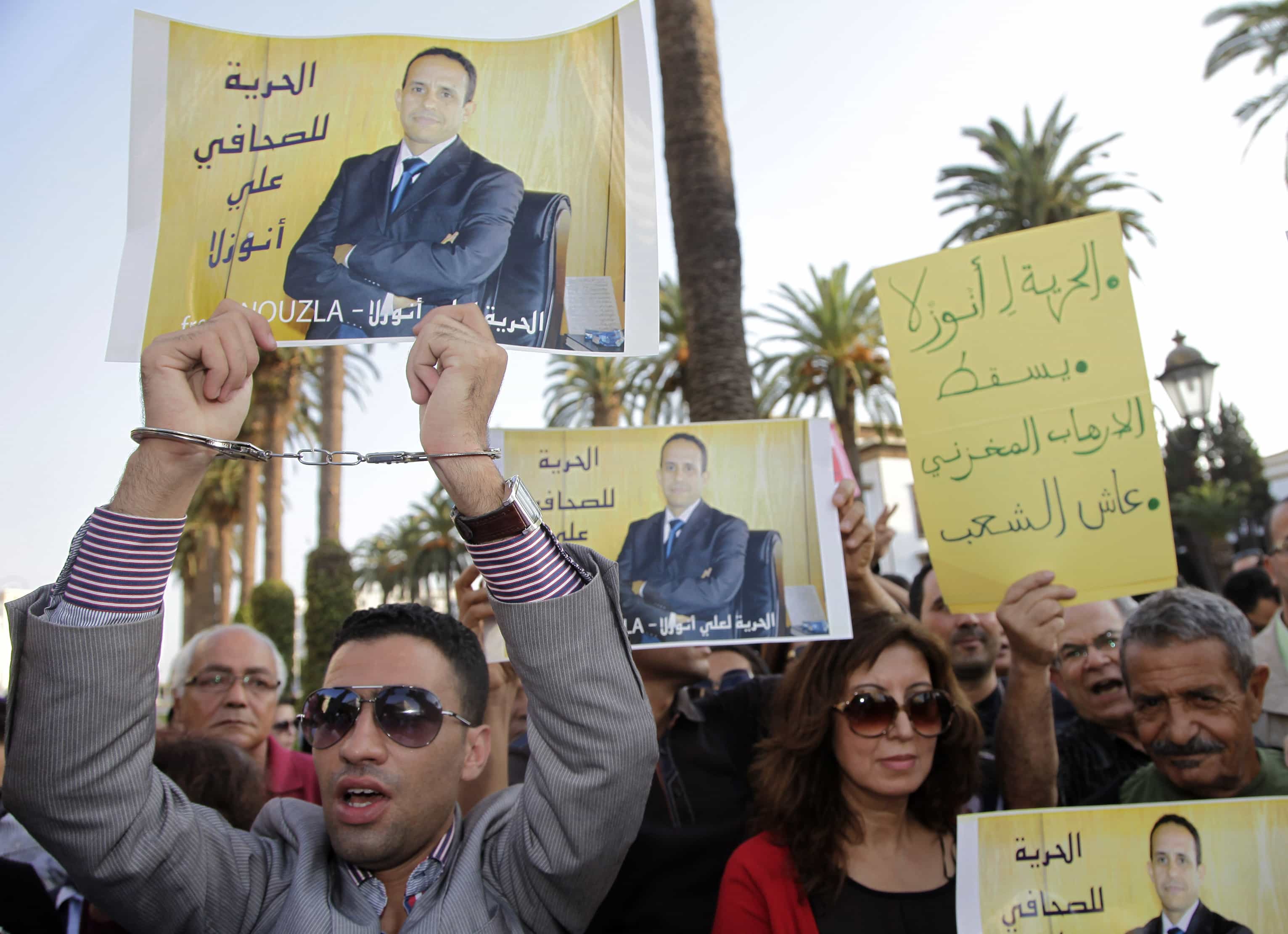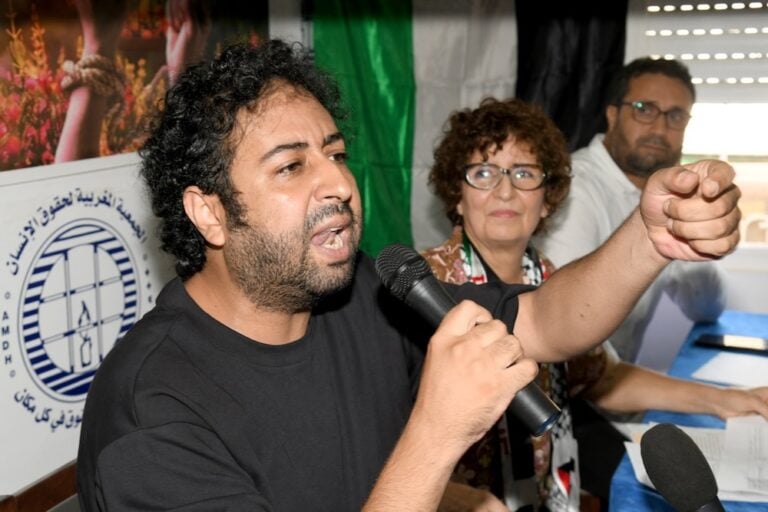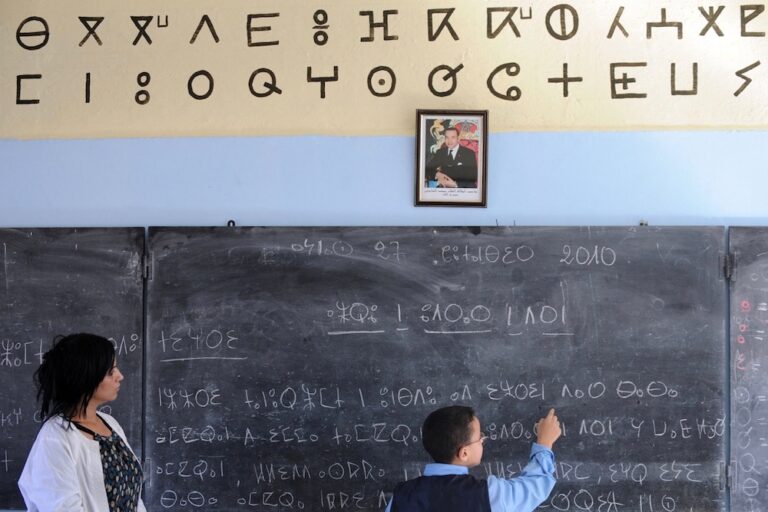In a region where censorship is the norm, Morocco has always stood out for its nominally free press, and mostly free Internet. But in the past year, that freedom has been repeatedly challenged.
In a region where censorship is the norm, Morocco has always stood out for its nominally free press, and mostly free Internet. But in the past year, that freedom has been repeatedly challenged, most recently when editor Ali Anouzla was imprisoned under terrorism charges for linking to a news article that linked to a YouTube video. Now, the latest threat to face Moroccans is the Code Numérique, a draft bill that would impose additional restrictions on the country’s Internet. I interviewed activist Zineb Belmkaddem and the lawyer pseudonymously known as @IbnKafka to get their take on the threats Moroccan Internet users now face.
Jillian York: Morocco has never heavily censored the Internet; I remember only a few sites being blocked, including LiveJournal, and even that is now accessible. Why do you think that is?
Zineb Belmkaddem: The strategy of the Moroccan authorities has been to “watch” the internet, and often times intimidate and humiliate those who criticize the regime, rather than censor.
Since the Arab uprisings erupted, the authorities handled online calls for street protests in Morocco first through propaganda, mass negative comments, intimidation, then physical repression. Online censorship was not at the top of the list per se because the priority was to control the crowds on site. If anything, “watching” the internet helped them know when/where it was all going to happen via accessible Facebook pages and events, whereas censorship would have rendered that harder.
However, as the numbers of protesters shrank due to police violence, arrests and intimidation, the authorities had regained control of the streets and tried to control the Internet.
News that the secret services had teamed up with Amesys and were already using deep packet inspection for surveillance had broken, but the regime had moved to the next phase when they arrested and jailed Ali Anouzla, editor of Lakome–one of the only politically independent online newspapers in Morocco–in September, 2013, for sharing an Al Qaeda video linked to another news site.
Shortly after that, Lakome.com and fr.Lakome.info, the Arabic and French versions of Lakome, were blocked in Morocco. I don’t know about everyone else, but I still cannot access either from Morocco unless I’m using a VPN.
JY: What is the Code Numérique? Who proposed it? What kind of restrictions would it place on the Internet?
@IbnKafka: The Code Numérique is a draft bill. The initial project/study that produced the draft bill was started by Ahmed Reda Chami, who was Minister of Industry, Trade, and New Technologies before the government reshuffle. The study was reportedly carried out by Alain Bensoussan, a French Law Firm with a branch in Casablanca. The department of new technologies is now known as “Digital Economy,” and the project was a part of the Maghreb Digital program’s “Maroc Numeric” 2013 strategy, to reinforce the legislative framework, a step towards digital trust.
However, several articles clearly jeopardize users and citizens’ freedom online. Articles 24 and 73, for instance, seeks to restrict views expressed online by forbidding disrespect to the king, the regime or public order. It is true that articles 38 and 41 of the Code de la Presse (press law) already provide for sanctions against whoever “offends” the King, Islam, the monarchy, or Morocco’s territorial integrity, including over Internet. They extended the reach of the law to include statements offending against public order, national security, necessities of public service, or public policy. The vagueness of these additional “red lines” would give the authorities arbitrary powers to limit and sanction freedom of expression over the net, especially as Article 73 authorizes the authorities to block the access to offending websites.
Taken together these provisions could be used to censor websites, sanction, and jail activists, or anyone who would openly criticize or challenge decision makers. The dangers to freedom of speech and opinion are immeasurable, all the more since Morocco’s radio and television channels are closely monitored and allow little debate on contentious political issues, and its printed media are suffering under both the global trend against paper media and the increased clampdown on independent journalists in Morocco.
After the backlash on Moroccan online communities–especially Facebook and Twitter- throughout the past days, Moulay Hafid Alamy, the new minister, reportedly decided to withdraw the draft bill for review, but Morocco’s online community is quite obviously under increased threat. Many individuals, whether citizens or journalists, have been prosecuted and jailed over the past decade for expressing their views on Internet, but this bill would multiply the instruments to deflect Morocco’s burgeoning on-line community.
JY: In response to the Code Numérique, you instigated a crowdsourced document, that produced a pretty rapid and comprehensive response in several languages. Why did you take this approach?
ZB: Moroccans online were all pretty angry and frustrated at the officials who had come up with a document that was clearly going to restrict freedom online. Some articles were outrageous, as mentioned in the answer to your previous question.
So as I was tweeting and sharing, Rezki El Mokaddam, a Moroccan blogger and social media enthusiast, picked up on one of my tweets about crowdsourcing our own Code Numérique, and created an open document, then we began to jot down simple ideas, and people began to join in.
This approach was simply to allow for an open space where we could all express our own views, discuss, comment, and write right the articles we believe were written wrongly in the proposed bill. We also believed there was a need for something constructive to come out of it all, because the anger and frustration created an online buzz and a lot of pressure, but not a viable alternative.
Meanwhile, the campaign against the Code Numérique on Twitter and Facebook did pay off and news came that the Minister of Industry, Commerce, Investment and Digital Economy was going to withdraw the draft bill.
JY: What inspired you to crowdsource a document?
ZB: Well, a group of us activists had previously worked for quite some time on the Moroccan Pirate Party project, so we had spent time discussing and gathering information online and offline in meetups on how to organize the party in a truly democratic, inclusive way, to allow most people to participate in decision making processes. Unfortunately, the project was attacked by state-run media (print, in this case). A smear campaign was launched in a daily newspaper’s front page against this embryo of a project. We realized that we weren’t going to be given a shot at becoming a legal entity, but we had worked on several documents and learned about the concept of liquid democracy, as well as crowdsourcing, in the process.
So It just seemed like an appropriate thing to do to allow everyone to participate in creating an alternative to the articles we were opposed to in the original Code Numérique.
JY: You’ve said that this is just the first step, and that there undoubtedly more battles against bad laws going forward. What do you think needs to happen in Morocco to combat things like this in the future?
ZB: I think that this is definitely just a first step, as the Minister and the high officials with whom some of us communicated online remained non-responsive and vague when we suggested crowdsourcing and new alternatives and platforms to allow for a more inclusive approach in drafting the revised Code Numérique. They are clearly going to cringe at the idea of allowing the online community to include, for instance, an article about rendering mass government surveillance online illegal, with sanctions on government employees if it happens. Some articles might be easier to reform, but others, I’m afraid, will need more aggressive campaigning on our side.
Another important point in addition to strong campaigns is that for citizens to fight against bad laws, they need to know more about the process of policymaking and learn about digital rights–at least, I speak for myself. It is true that some laws are clearly absurd, but it is important to know what the potentially good alternatives are, so this is definitely something we should focus on.



